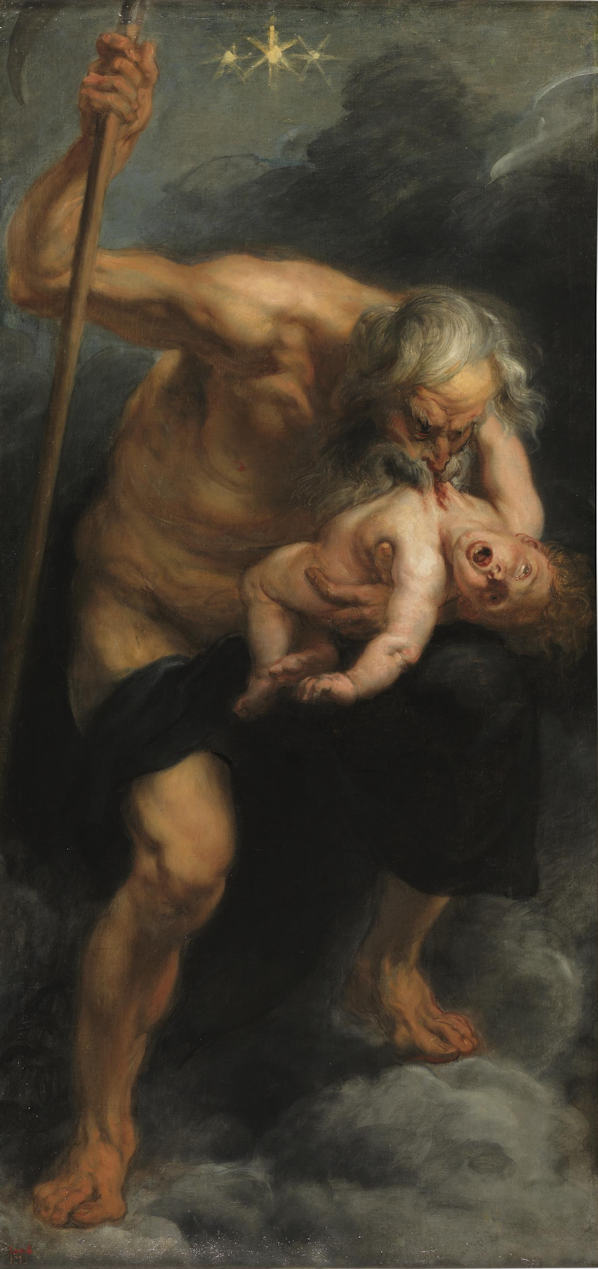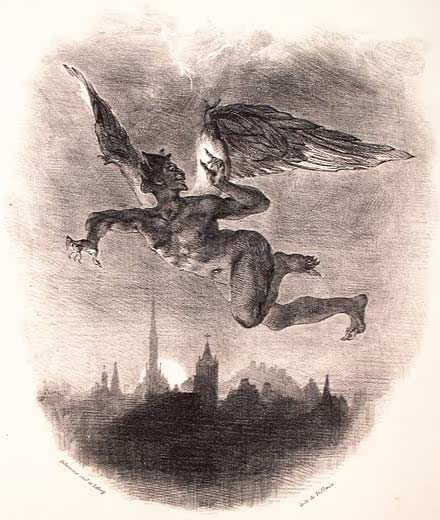|
Ancient armies were easily spooked by portents in the heavens or
on earth: "An ancient Greek military strategist, Onasander, writing
300 years after Hannibal, made the following observation: 'Soldiers
are far more courageous when they believe that they are facing
dangers with the good will of the gods; for they themselves are
watchful, each man, and they look out keenly for omens of sight or
sound and an auspicious sacrifice for the whole army encourages even
those who have private doubt.'" (Carthage Must be Destroyed, Richard
Miles, p. 251.) The prophets had noticed the tendency:
"Do not learn the way of the Gentiles; do not be dismayed at the signs of
heaven, for the Gentiles are dismayed at them." (Jeremiah 10:1-2).
This skittishness is characteristic of undeniably
brave pagan warriors; the pagans who met the settlers on the American
plains were of a similar mind-set: "Comanches were extremely
predictable. They never changed their methods. They were deeply
custom-bound and equally deeply mired in their notions of medicine
and magic. They reacted to a given situation — such as the killing
of their war chief or medicine man — in exactly the same way, every
time. In white man's terms, they were easily spooked."
(Empire of the Summer Moon, S. C. Gwynne, pp. 142-143). Thunder was a
fact on the battlefield, though of course subject to interpretation: "The son of Tydeus was in two minds whether or no to turn his horses round again and fight him. Thrice did he doubt, and thrice did Zeus thunder from the heights of Ida in token to the Trojans that he would turn the battle in their favor."
(Homer Iliad, Book 8, 167).
As an example of the kinds of situations this skittishness
produced on ancient battlefields, here a brave soldier counsels retreat...because an bird suffered a mishap struggling with its
prey:
"While they were busy stripping the armor from these heroes, the youths who
were led on by Polydamas and Hector (and these were the greater part and the most
valiant of those that were trying to break through the wall and fire the ships) were
still standing by the trench, uncertain what they should do; for they had seen a
sign from heaven when they had essayed to cross it — a soaring eagle that flew
skirting the left wing of their host, with a monstrous blood-red snake in its talons
still alive and struggling to escape. The snake was still bent on revenge, wriggling
and twisting itself backwards till it struck the bird that held it, on the neck
and breast; whereon the bird being in pain, let it fall, dropping it into the
middle of the host, and then flew down the wind with a sharp cry. The Trojans were
struck with terror when they saw the snake, portent of aegis-bearing Jove,
writhing in the midst of them, and Polydamas went up to Hector and said,
'Hector, at our councils of war you are ever given to rebuke me, even when I speak
wisely, as though it were not well, forsooth, that one of the people should
cross your will either in the field or at the council board; you would have them
support you always: nevertheless I will say what I think will be best; let us not
now go on to fight the Danaans at their ships, for I know what will happen if this
soaring eagle which skirted the left wing of our with a monstrous blood-red snake in
its talons (the snake being still alive) was really sent as an omen to the Trojans
on their essaying to cross the trench. The eagle let go her hold; she did not succeed
in taking it home to her little ones, and so will it be — with ourselves; even
though by a mighty effort we break through the gates and wall of the Achaeans, and
they give way before us, still we shall not return in good order by the way we
came, but shall leave many a man behind us whom the Achaeans will do to death in
defense of their ships. Thus would any seer who was expert in these matters, and
was trusted by the people, read the portent.'"
(Homer, Iliad, Book XII).
As can be seen from this episode, the heavenly bodies do not
actually have to do much of anything to produce a striking impact on
the behavior of a pagan military force. If some astral state or conjunction
is thought to presage defeat, this can induce panicked flight. This
sensitivity is characteristic of pagan religion: "Do not learn the
way of the Gentiles; do not be dismayed at thee signs of heaven, for
the Gentiles are dismayed at them." (Jeremiah 10:2). When people of
such different cultures meet each other, world views collide
alongside the armed bands; according to the pagan view of the world,
stars and other natural phenomena are animate, intentional, powerful,
and very likely responsible for the weather. This is not necessarily
the Jewish world-view, but certainly is a common pagan construct. The
stars are their gods.
To devotees of the astrological system, the stars do not have to do
anything remarkable to deliver a message, encouraging or
discouraging; their normal courses are interpreted as fraught with
meaning. By appearing in a favorable conformation, they might
encourage rash aggression which can back-fire, or by lining up in a
baleful but still perfectly natural configuration, they can induce
hesitancy and over-caution. The stars are drawn into combat, willing
or not, by the beliefs of the astrologers. They have already been
'conscripted' into the military by their devotees; simply by being where
they are at, they are flashing commands; but once arrayed
on the battle-field, they are free to display their true loyalties. Whatever their input on
this occasion, it ultimately worked to Israel's advantage. Perhaps it was
'treachery:' they 'encouraged' Sisera then played him false. Perhaps
it was open warning: 'Retreat! Retreat!' (the stars do not actually say
'retreat,' but pagan astrologers 'interpret' them as saying such
things.) The rainstorm itself, if believed, by the pagans, to have been sent
by their star-gods, is a communication of this sort, an act of taking
sides.
By contrast to pagan armies, those who put their trust in
the LORD are not easily spooked. Josephus retells the story of a pagan army
standing around waiting...for a bird to tell them which way to go:
"As I was myself going to the Red Sea, there followed us a man, whose name was Mosollam; he was one of the Jewish horsemen who conducted us; he was a person
of great courage, of a strong body, and by all allowed to be the most skillful archer
that was either among the Greeks or barbarians. Now this man, as people were
in great numbers passing along the road, and a certain augur was observing an
augury by a bird, and requiring them all to stand still, inquired what they staid
for. Hereupon the augur showed him the bird from whence he took his augury, and
told him that if the bird staid where he was, they ought all to stand still; but
that if he got up, and flew onward, they must go forward; but that if he flew
backward, they must retire again. Mosollam made no reply, but drew his bow, and shot
at the bird, and hit him, and killed him; and as the augur and some others were very
angry, and wished imprecations upon him, he answered them thus: Why are you so mad
as to take this most unhappy bird into your hands? for how can this bird give us
any true information concerning our march, who could not foresee how to save himself?
for had he been able to foreknow what was future, he would not have come to this
place, but would have been afraid lest Mosollam the Jew should shoot at him, and
kill him.'" (Flavius Josephus, Against Apion, Book 1).
So the Jew Mosollam was unimpressed with the bird's
hesitation. Mosollam was no atheist, but his understanding of bird
behavior was realistic and naturalistic, because his religion
dictated such an understanding. And doesn't it make more sense for the army to advance or retreat based
on its military interest, rather than to rely on the generalship of a bird?
So this is one way stars can take sides and fight: it may be there was a sign, conjunction, or portent meaningful to
pagan star-interpreters. Deborah's army was unimpressed by the portent in the
heavens, but the facing pagan army was scared witless, because the pagans take
the ordinary motions of the heavenly bodies either as portents of doom,
or as harbingers of victory. So the stars did their bit in the battle: the
military advantage went to Israel, when the stars alarmed their pagan
devotees by an unfavorable conjunction or other unsettling phenomenon.
The Anasazi and other groups devoted who knows how many man-hours
to building elborate structures in the American Southwest. But then
they left, abandoning the buildings that so much blood, sweat, and
tears had gone into. What triggered their departure? In a similar
case, it was a snake:
"I told her that I knew an archaeologist who had
excavated a post-Columbian Zuni site down in New Mexico, and when he
had asked around, trying to figure out why the place was abandoned,
people had told him that a rattlesnake had gotten inside. As simple
as that. It did not seem peculiar to him that in the desert, in a
building with a sheet of fabric for a door, a rattlesnake would show
up. But it had made an impression on the residents, sending them
packing. Maybe a rattlesnake is all a migration needs to get going,
an omen that sets it off." (Childs, Craig. House
of Rain: Tracking a Vanished Civilization Across the American
Southwest (p. 128).)
Take this tradition for what it's worth. Perhaps these people
venerated snakes, or thought snakes were ambassadors from the
divine realm, or that they were actually divine. Taking a secular
approach to pest control, they would have gathered the snakes into
baskets and dumped them in the nearest water-trough. But there are two
aspects: what the problem is, and a rattlesnake is no doubt a
problem, they can kill you,— and what the people thought the
problem was. In like manner, a downpour on a battlefield is a
problem, as indeed it would be even to a modern army, just as the
Nazis found the impenetrable mud of Soviet Russia to be an obstacle.
But what the people thought the problem was might be even worse.
In the Bible text, the stars' contribution is paired with the brook
Kishon's activity, which appears not poetical but prosaic, the torrent
over-flowing its normal course, impeding the movements of the enemy army.
The brook Kishon does not have a mind and a will, but neither is
there any such thing as coincidence; no sparrow falls from the sky
apart from the Father, and the brook made common cause with Israel and 'helped' under God's command.
In parallel, the stars fighting in their courses could be, not 'poetic
language,' but some objective fact, something that actually happened,
marshalled by God into His master plan.
The pagans might have imagined their star-gods to have sent the rain
which made the brook overflow; we do not need to assume Israel
adopted the same system of meteorology to understand this as an ad hominem
rejoinder, mockery over the enemy's panicked flight. S0 this could be how
the unexpected rain storm affected the battle outcome: it was taken
as a portent.

|

